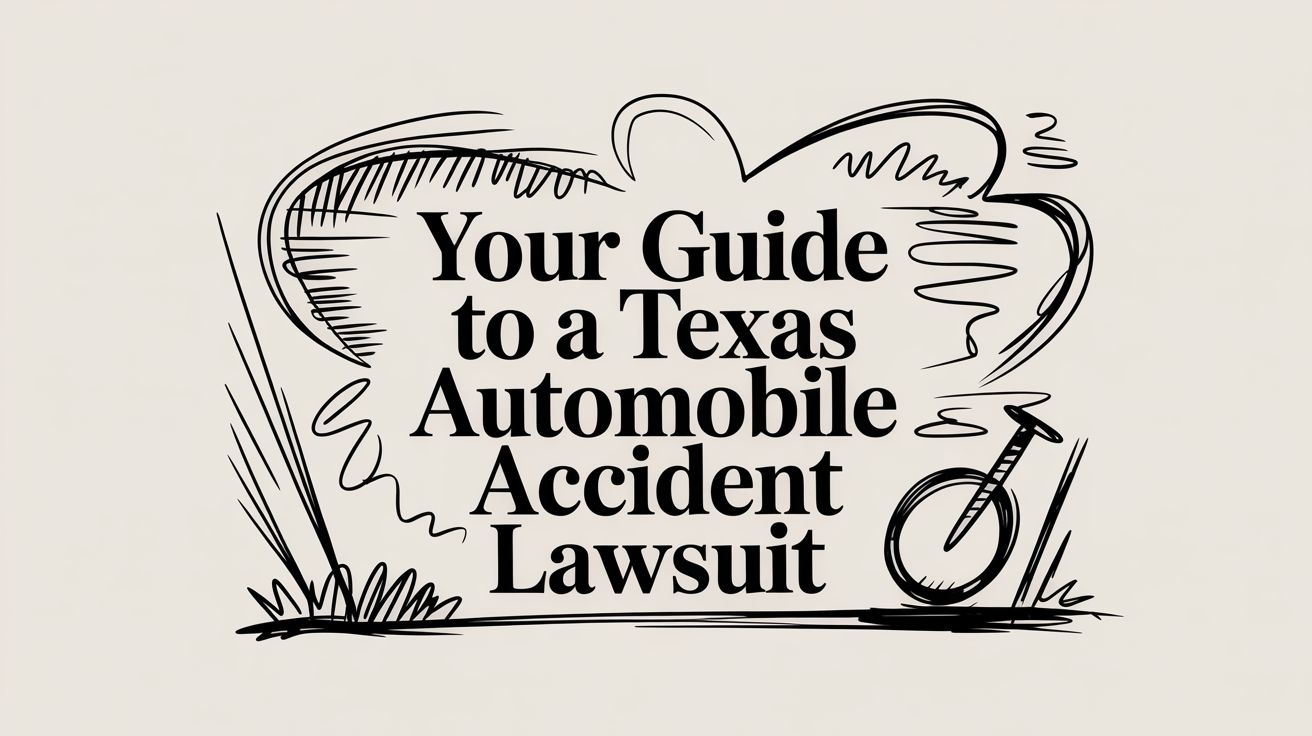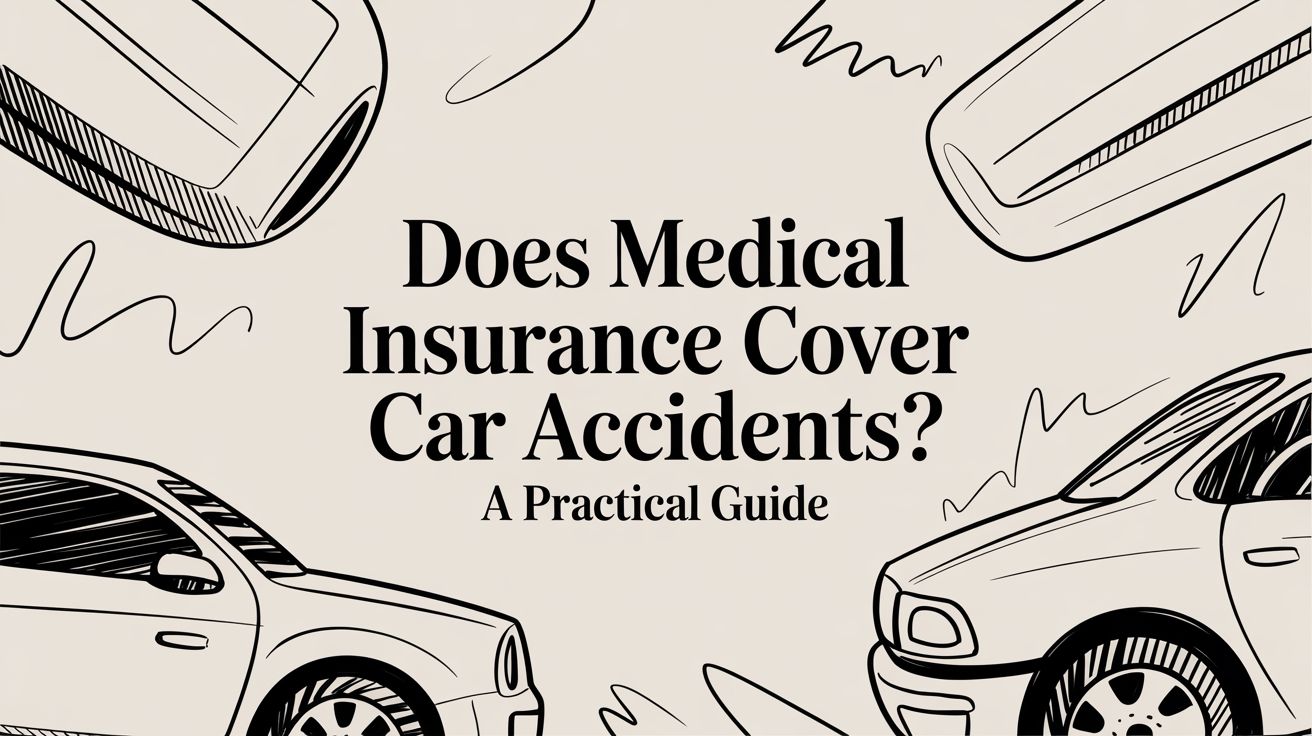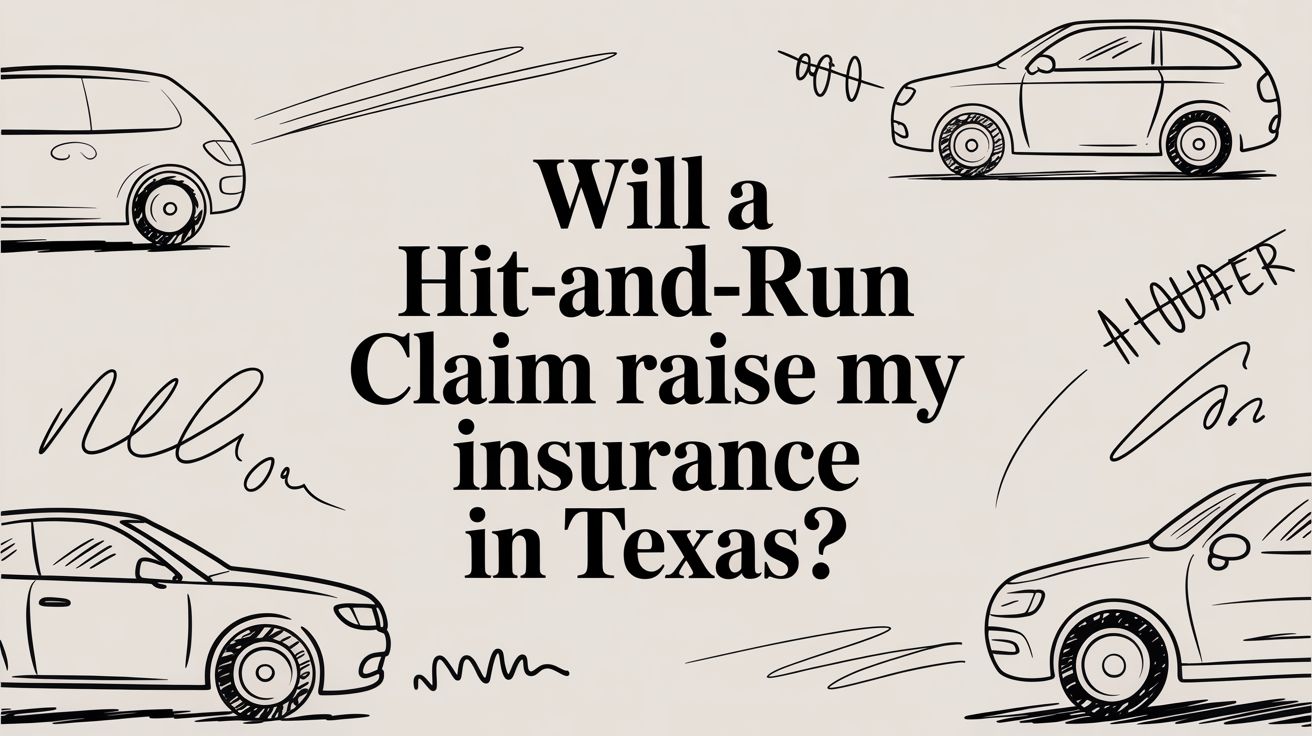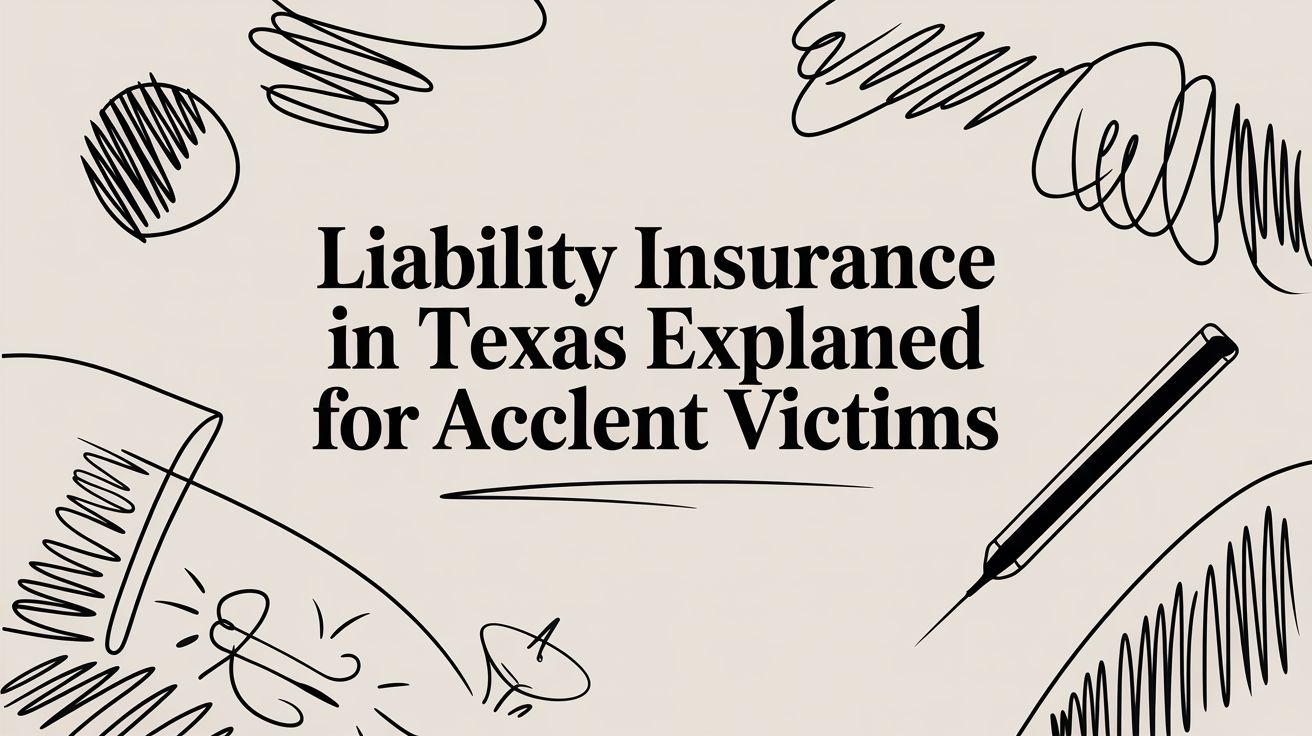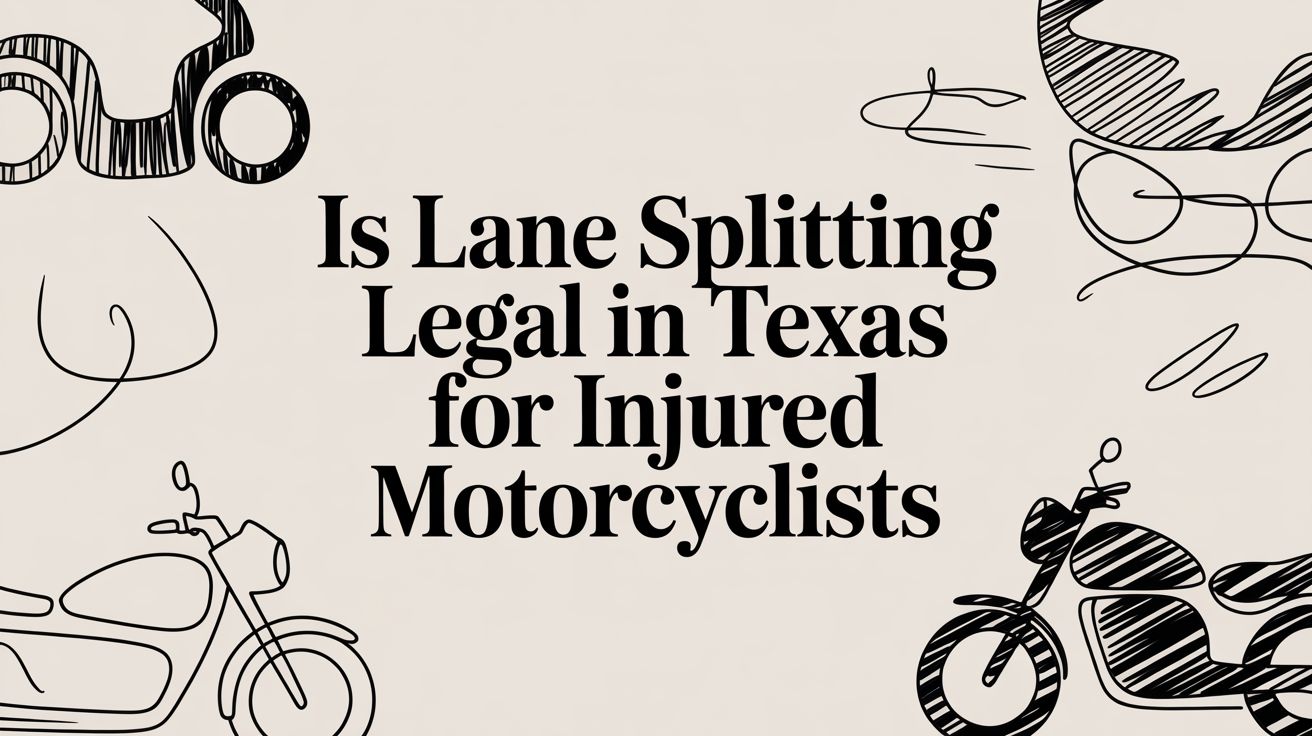A serious accident can change your life in seconds — but you don’t have to face it alone. In the aftermath of a crash, it’s easy to feel overwhelmed and unsure of what to do next. Your first priority is always safety. Your second is getting medical help. Your third is protecting your legal rights.
Knowing what to do in those first few chaotic moments can make a world of difference for your physical, emotional, and financial recovery. This guide offers clear answers about your rights and next steps.
Your First Moves at the Accident Scene
The moments right after a car wreck are disorienting. Your adrenaline is pumping, and it's tough to think clearly. But the actions you take right there on the scene lay the groundwork for your potential personal injury claim. Staying as calm as you can and following a few clear steps is your best defense.
The very first thing to do—before even unbuckling your seatbelt—is to assess the danger around you. Is your car sitting in the middle of traffic? Are there downed power lines, or can you see fluids leaking from a vehicle? The answers will dictate your next move.
Prioritize Safety Above All Else
If your car is in a dangerous spot, like the middle of a busy Houston freeway like I-45, and you can safely move it, pull over to the shoulder. Immediately turn on your hazard lights. That simple action warns other drivers and can prevent a second, often worse, collision.
However, if moving your vehicle is unsafe or if you or a passenger is seriously injured, do not move. For example, in a multi-car pile-up, the safest place is often inside your car until first responders arrive to secure the scene. Wait for the professionals to guide you.
The following graphic helps visualize these crucial first steps: ensuring safety, calling for help, and then gathering information.
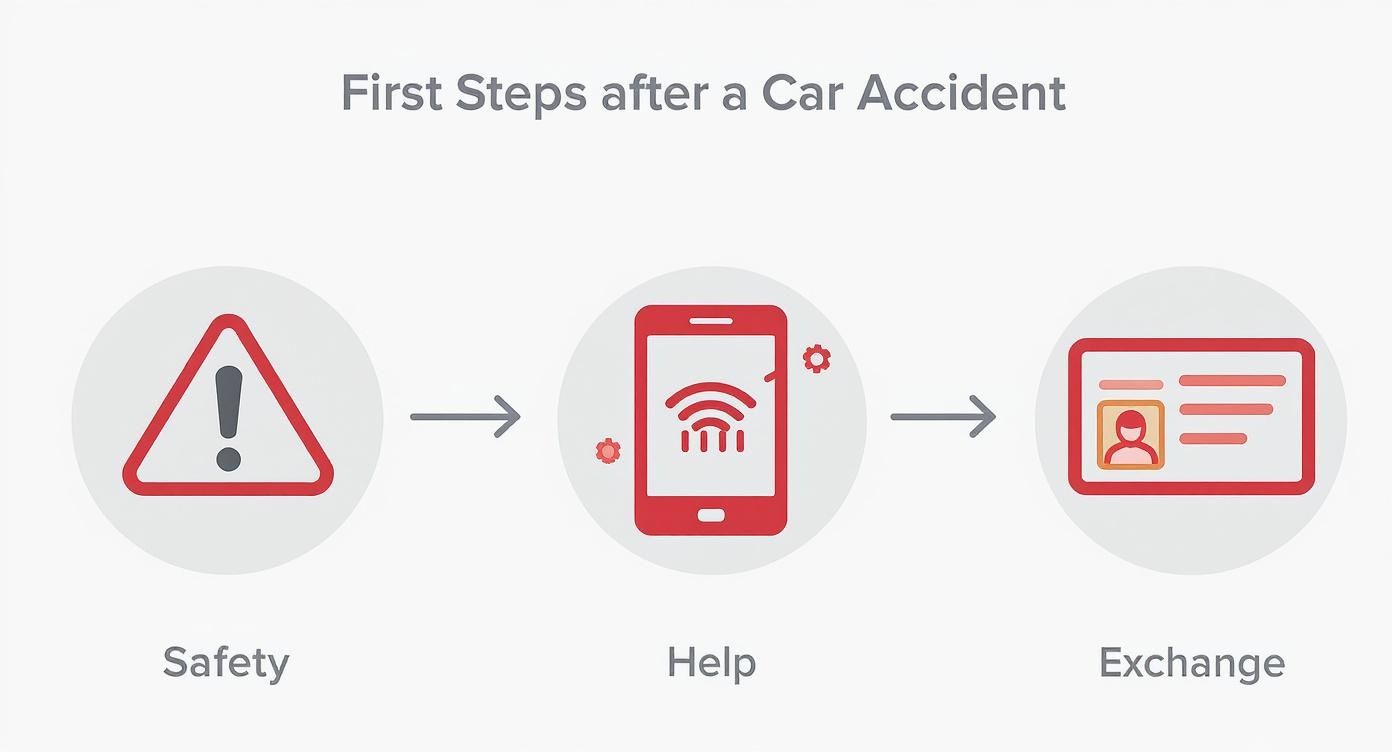
This visual guide reinforces that a systematic approach—safety first, then emergency services, then documentation—is the clearest path through the initial chaos of a crash.
To help you remember what's most important, here’s a quick checklist to keep in mind.
Immediate Post-Accident Checklist
| Action Item | Why It Matters for Your Safety and Claim |
|---|---|
| Move to a Safe Location (If Possible) | Prevents secondary accidents and protects you from oncoming traffic. |
| Call 911 Immediately | Gets medical help on the way and ensures a police report is created. |
| Check Yourself and Passengers for Injuries | Adrenaline can mask pain; some injuries aren't obvious right away. |
| Take Photos and Videos of Everything | Documents vehicle damage, the scene, road conditions, and injuries. |
| Exchange Information with the Other Driver | Collects names, insurance details, and contact info for your claim. |
| Speak to Witnesses | Gathers unbiased accounts of what happened before memories fade. |
| Do Not Admit Fault or Apologize | Protects your legal rights and prevents your words from being used against you. |
Following these steps creates a solid foundation for everything that comes next.
Call 911 and Check for Injuries
Your next move is to call 911, no matter how minor the accident seems. A police report is a critical piece of evidence. It's an official account of the incident that both insurance companies and your Houston car accident attorney will rely on. When you call, give your location as precisely as you can.
While you wait for help to arrive, check on yourself and your passengers. Adrenaline is powerful and can easily mask the pain of an injury. Even if you feel fine, you could be hurt. If someone is unconscious or complains of neck or back pain, do not move them unless they are in immediate danger, like from a fire. Let the paramedics handle it.
What to Say and What Not to Say
Once you've made sure everyone is as safe as possible, you’ll likely need to speak with the other driver. This is a crucial moment. What you say—and more importantly, what you don’t say—matters a great deal.
Crucial Takeaway: Never admit fault or apologize. A simple "I'm sorry" can be twisted by an insurance adjuster to argue that you accepted responsibility, even if you were just being polite. Stick to the facts.
In Texas, you are legally required to exchange some basic information:
- Name and contact information
- Insurance company and policy number
- Driver's license number
- License plate number
The easiest way to do this is to use your phone to take pictures of their documents. Keep the conversation calm and courteous, but avoid discussing how the accident happened. Save those details for the police and, later, for your attorney. This discipline can protect you from having your words used against you. National statistics show that while crash fatalities are decreasing, the total number of accidents remains high, making it vital to know these steps. You can learn more from the NHTSA.
How to Document Evidence Like a Pro
Once everyone is safe, your next role is that of an investigator. The evidence you gather in these first few minutes is the bedrock for your entire claim. Your smartphone is your most valuable tool here, turning a chaotic scene into a clear, undeniable story.
The information you collect can be the difference between a fair settlement and an uphill battle. It’s hard proof of what happened, who was involved, and how severe the damage is. This documentation is your shield against the other driver changing their story later.
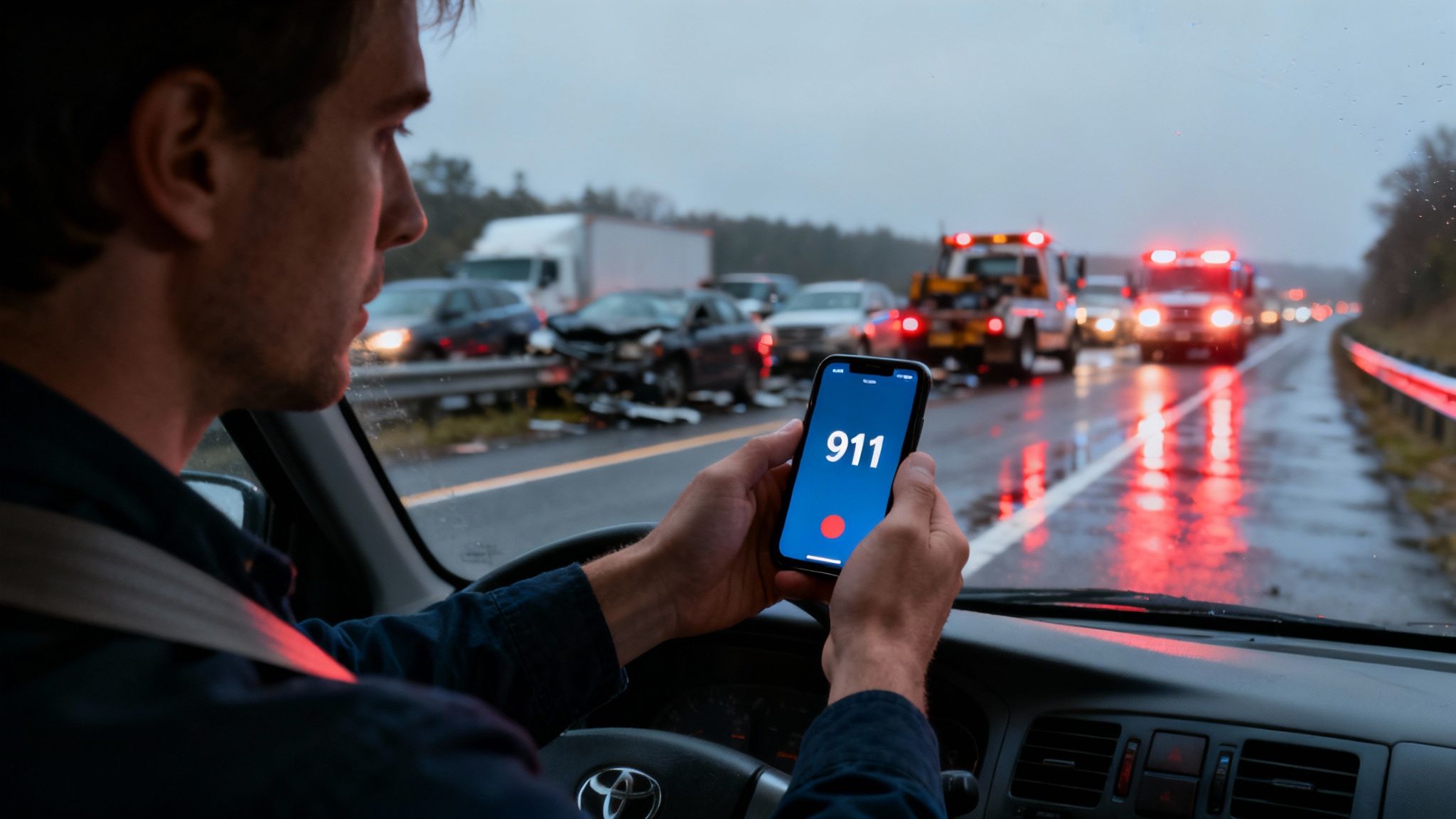
Capture the Scene With Your Camera
Think like a crime scene investigator. Use your phone's camera to paint a complete picture of the accident scene. Don't just snap one or two quick photos of the damage; you need to document everything. The more visual evidence you have, the harder it is for the other party's insurance company to dispute the facts.
Your photo checklist should include:
- Wide-Angle Shots: Pull back and take panoramic photos of the entire scene from different angles. Capture the final positions of all cars, nearby traffic signs, and the general road layout.
- Close-Up Damage: Get detailed, close-up shots of the damage to all vehicles involved, not just your own. Photograph every dent, scratch, and broken part from multiple perspectives.
- Road Conditions: Document anything that might have contributed to the crash, such as skid marks, debris on the road, potholes, or overgrown bushes obscuring a stop sign.
- Key Information: Take clear, readable photos of the other driver's license, insurance card, and license plate. It's much faster and more accurate than trying to write it all down.
Imagine a wreck at a busy Dallas intersection. The other driver insists they had a green light. A photo showing debris scattered in the middle of the intersection, combined with another shot showing the traffic signal from your point of view, can provide powerful context that supports your side of the story.
The Importance of Witness Information
Independent witnesses are invaluable. Their testimony is seen as neutral and can be the deciding factor, especially when you and the other driver have conflicting stories. If anyone stopped to help or saw what happened, politely ask if they'd be willing to share what they saw.
Key Insight: A single, unbiased witness statement can shut down a dispute over fault before it even begins. Don't be shy about asking for help; most people are willing to do the right thing if they know it can make a difference.
When you talk to a witness, your goal is simple. Just try to get their:
- Full name and phone number.
- A quick, one-sentence summary of what they saw.
You don’t need to record a formal statement. Getting their contact information is enough. This allows your Texas personal injury lawyer to follow up with them later. Their account can confirm details in the police report and bring clarity to critical questions, like who really had the right of way.
Secure the Official Police Report Details
The police report is one of the most critical documents you'll deal with. While the officer won't hand you a copy right there on the road, you absolutely must get the information needed to find it later.
Before the officer leaves the scene, make it a point to ask for:
- The officer's name and badge number.
- The police report number (sometimes called an incident or case number).
That report number is your ticket to getting the official report. This document will contain the officer’s initial findings, diagrams of the accident, and any citations issued. It becomes a cornerstone of your claim, so getting this information is non-negotiable.
Protecting Your Health and Rights After Leaving the Scene
The chaos doesn't end when the tow truck drives away. What you do in the hours and days after leaving an accident scene is just as critical for protecting your future. Your focus needs to shift to two things: safeguarding your health and preserving your legal rights. These goals go hand-in-hand, and the steps you take now will shape the outcome of your recovery.
Even if you walked away feeling fine, getting a medical evaluation is non-negotiable. The shock and adrenaline from a crash are experts at hiding serious injuries. What feels like minor stiffness could be the start of a debilitating whiplash injury, and that dull ache might be a sign of internal damage you can't see or feel yet.
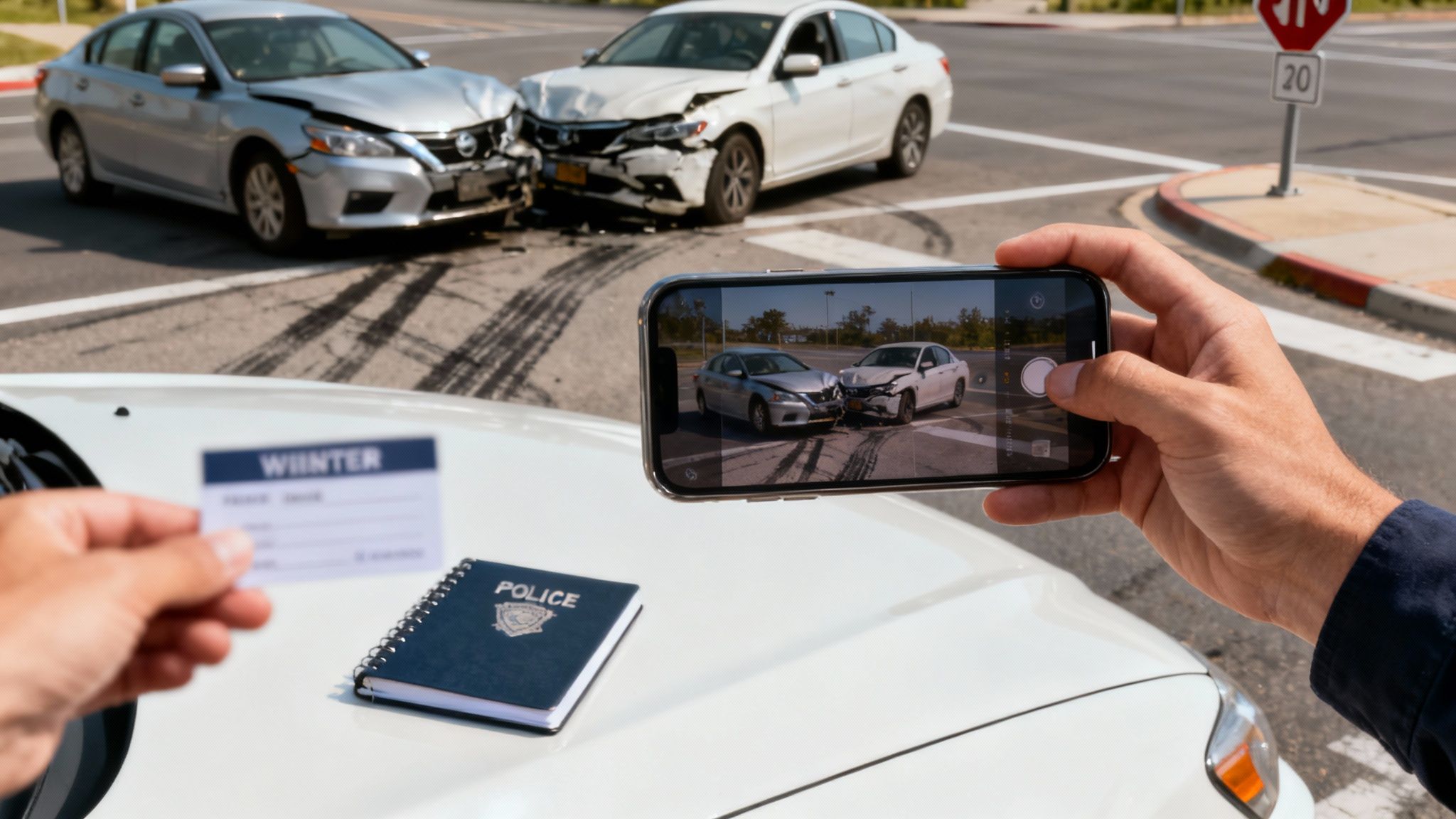
Why Seeking Immediate Medical Care is Crucial
Putting off a visit to the doctor is one of the biggest mistakes we see people make. Insurance adjusters are trained to find any reason to downplay or deny your claim. If you wait days or weeks to get checked out, they will almost certainly argue that your injuries weren't caused by the accident.
Seeking prompt medical attention does two key things:
- It puts your well-being first, diagnosing and treating hidden injuries before they have a chance to get worse.
- It creates a direct link in your medical records between the accident and your injuries, making it much harder for an insurance company to dispute your claim.
Understanding Texas as an "At-Fault" State
As you start thinking about an insurance claim, you must understand how Texas law works. Texas is an "at-fault" state. This means the person who is legally responsible for causing the accident is also responsible for paying for the damages.
To get any compensation, you have to prove the other driver was negligent. Negligence is a legal term that means someone failed to act with reasonable care, and that failure caused you harm. This could be anything from texting while driving and rear-ending you to speeding through a red light.
A Note on Shared Responsibility: Texas also follows a "modified comparative responsibility" rule. This means if you are found to be partially at fault for the accident, your compensation can be reduced by your percentage of fault. Crucially, if you are found to be 51% or more responsible, you are blocked from recovering any damages at all.
This rule is exactly why it's so critical to be careful about what you say. An insurance adjuster can twist any statement you make to try and shift more of the blame onto your shoulders.
What You Should Never Say After a Crash
Your words carry immense weight after an accident. What seems like a harmless, polite comment can be used against you to damage your case. It is vital to be mindful of your language when speaking to anyone—especially the other driver or their insurance company.
Here are things to strictly avoid saying:
- "I'm sorry" or "It was my fault." Even if you're just being polite, these phrases can be interpreted as a full admission of guilt.
- "I'm not hurt" or "I feel fine." You aren't a doctor. You have no idea about the full extent of your injuries, and this statement will absolutely be used to deny your medical claims later.
- Giving a recorded statement. You are under no obligation to give a recorded statement to the other driver's insurance adjuster without your own attorney present.
Imagine a simple rear-end collision on the Katy Freeway. You might instinctively say, "I'm so sorry, are you okay?" While well-intentioned, that "I'm sorry" could be all an adjuster needs to argue you admitted fault, potentially costing you the compensation you deserve. This careful approach is important, especially when you consider that road traffic crashes result in approximately 1.19 million deaths globally each year, with tens of millions more left with long-term injuries. You can find more global road traffic injury statistics to understand the bigger picture.
Navigating Insurance Claims and Texas Law
After a car wreck, dealing with insurance companies can feel like a second job you never asked for. You have to know the rules of the game to protect yourself and your claim. Let’s walk through what you need to do, what you should never say, and how Texas law impacts your recovery.
Reporting Your Crash to Your Insurer
When you make that first call to your insurance company, less is more. Stick strictly to the facts. Just report the date, time, and location of the crash, along with the names of the other people involved. That’s it.
You want to avoid telling a long story or guessing about who was at fault.
- Notify them within 24 hours if possible.
- Use neutral language, like "I was involved in a collision." If they push for details, you can say, "I need to consult my attorney before giving a full statement."
- Always get the claim number and the name of the adjuster you spoke with. Jot down the time and date of the call.
What Not to Say to an Adjuster
Remember, insurance adjusters are looking out for their company's bottom line. Their job is to minimize the payout, not to maximize your recovery.
Never admit fault or apologize. A simple "I'm sorry" can be used against you to argue that you accepted responsibility for the crash.
Your words can shape your claim more than your injuries.
Don't agree to give a recorded statement until you've spoken with a lawyer. Adjusters are trained to ask leading questions designed to get you to say something that hurts your case. They might also make a lowball offer right away, hoping you’ll take it before you know the true extent of your injuries and expenses. Speaking with a Houston car accident attorney first is your best defense.
Key Phrases to Protect Your Claim
When you're on the phone with any insurance company, using precise, careful language is critical. These phrases help you set clear boundaries and protect your legal rights.
- “I am receiving medical treatment for my injuries.”
- “Please direct all future questions to my attorney.”
- “I'm still gathering all the facts and can't provide a detailed statement right now.”
- “I do not want to discuss fault at this time.”
This approach keeps you in control of the information you share and prevents you from making accidental admissions that could sink your claim.
How Comparative Responsibility Works in Texas
Texas law operates on a rule called modified comparative responsibility. It means that if you are found to be partially at fault for the accident, your financial recovery is reduced by your percentage of blame.
If a jury decides you were 51% or more responsible for the crash, you get nothing.
| Your Percentage of Fault | Impact on Your Compensation |
|---|---|
| 0% | You recover full damages. |
| 20% | A $100,000 settlement is reduced to $80,000. |
| 51% or more | You recover nothing. |
I’ve seen this play out many times. After a Houston freeway crash, a driver was found 20% at fault for a lane-change accident. The jury awarded $50,000 in damages, but because of his share of the blame, his final recovery was cut to $40,000. This is exactly why collecting evidence at the scene is so important.
How Long Do You Have to File a Claim in Texas?
You don't have forever to act. In Texas, the statute of limitations for personal injury claims is two years from the date of the accident. If you miss this deadline, your right to file a lawsuit is almost always gone for good.
It's crucial to understand that the clock starts ticking on the day of the crash, not on the day you realize how serious your injuries are.
- Mark the accident date on your calendar.
- Set reminders months before the two-year deadline.
- Talk to a Texas personal injury lawyer long before that deadline approaches.
Real-World Example: A driver from La Porte, TX, tried to file his lawsuit one day after the two-year deadline passed. The court dismissed his case, and he lost any chance to recover money for his mounting medical bills.
Keep your police report number, medical records, and all correspondence from insurance companies in one safe place.
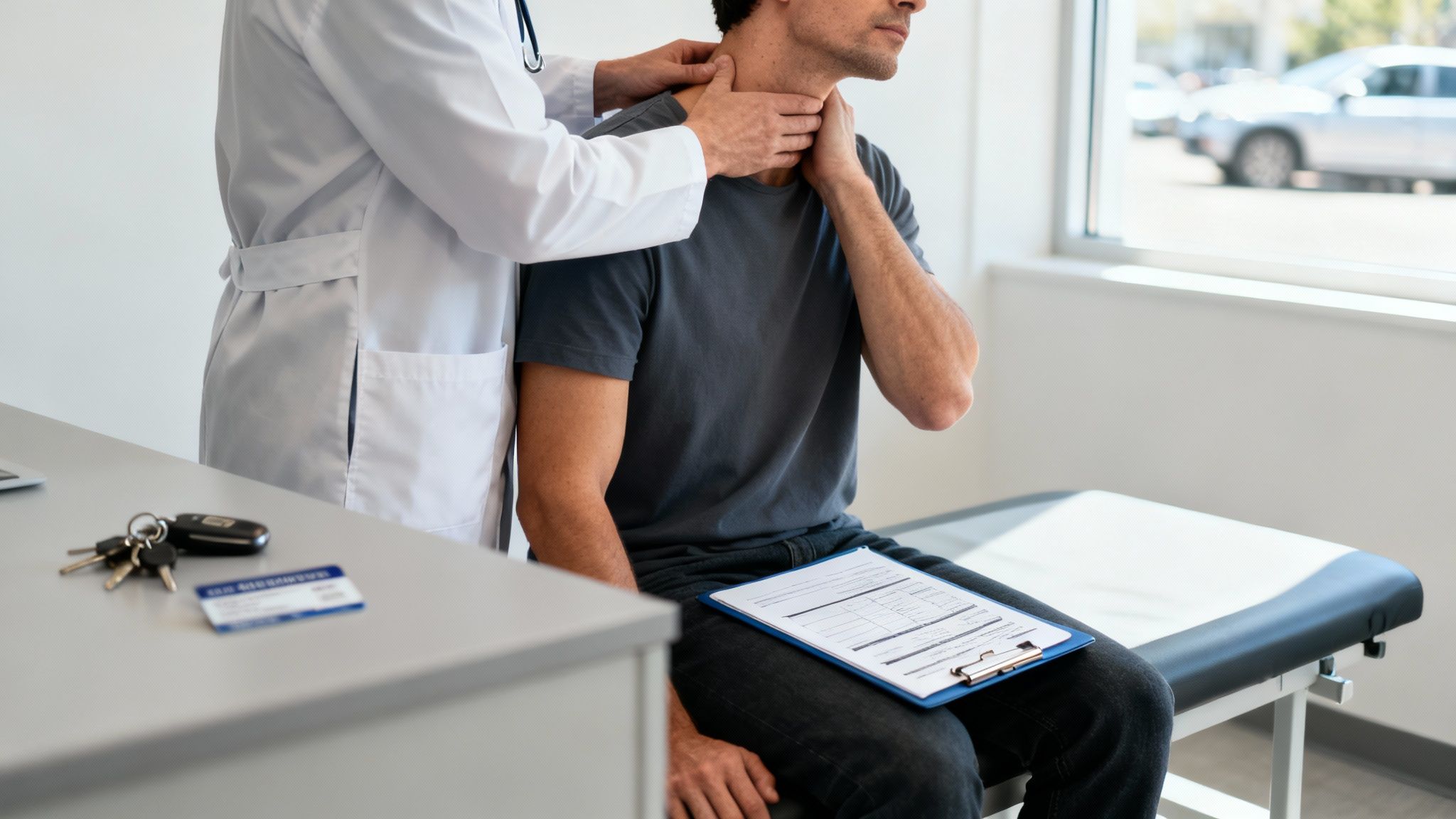
Preparing for Complex Cases
If your accident involved a commercial truck, resulted in catastrophic injuries, or led to the loss of a loved one, the rules get more complex. Crashes with 18-wheelers, for example, bring federal regulations into play. A truck crash lawyer Houston knows how to navigate the maze of state and federal laws.
Think about a semi-truck collision on I-10 near Beaumont. The victim's family needed to secure evidence like the driver's hours-of-service logs before the trucking company could destroy them. An experienced lawyer immediately sends a legal demand to preserve that evidence, which is critical for proving negligence.
In a complex case, you need to be thorough:
- Preserve evidence like driver logs and inspection reports.
- Track every dollar of lost wages and get expert opinions on future medical needs.
- If the crash was fatal, you’ll need to consult a wrongful death lawyer Texas immediately to protect your family's rights.
For more insight, it’s worth reading about why an insurance company might refuse a claim and your options.
Acting on Your Rights
The minute you feel the insurance adjuster is giving you the runaround or trying to blame you for the wreck, it's time to call The Law Office of Bryan Fagan, PLLC. Our team will handle the adjusters, preserve critical evidence, and work with experts to calculate your total damages.
We work on a contingency-fee basis, which means you won't owe us a dime unless we win your case.
Scheduling a free consultation is the first step toward getting your life back on track. Reach out today and let our Texas personal injury lawyers start fighting for you.
When Should You Call a Car Accident Lawyer?
After a wreck, one of the biggest questions on your mind is probably, "Do I really need to hire a lawyer?" If it’s a minor fender-bender with no injuries, you may be able to handle it on your own. But some situations are immediate red flags that you need professional legal help.
Trying to navigate a complex claim alone puts you at a huge disadvantage. Insurance companies have teams of lawyers whose job is to protect their bottom line, not yours. Hiring an attorney isn’t about picking a fight; it’s about leveling the playing field.
Clear Signs You Need an Attorney
Certain accidents should immediately tell you it's time to get an expert legal eye on your case. If you find yourself in any of these situations, you should call a Houston car accident attorney.
- There are serious injuries: If you or a passenger suffered significant injuries—like broken bones, a traumatic brain injury, or anything requiring surgery or a hospital stay—an attorney is essential. These cases involve calculating future medical costs and long-term care needs.
- Fault is being disputed: Is the other driver blaming you? Is the police report unclear? You need an advocate who can launch an independent investigation to find evidence that proves the other party’s negligence.
- The crash involved a commercial truck: Accidents with 18-wheelers are a different beast. They involve complicated state and federal regulations, and you're going up against a large trucking company's legal team. A truck crash lawyer Houston specializes in these high-stakes cases.
- The at-fault driver was uninsured or underinsured: Navigating your own UM/UIM policy can be just as frustrating as dealing with the other driver's insurer. A lawyer makes sure your own insurance company treats you fairly.
- The insurance company’s offer is too low: If the settlement offer doesn't come close to covering your medical bills and lost wages, that's a clear sign you need a professional negotiator fighting for you.
What a Personal Injury Lawyer Does for You
Most people think a lawyer’s only job is to go to court, but that’s a small piece of the puzzle. A dedicated Texas personal injury lawyer becomes your advocate, investigator, and negotiator, handling every detail so you can focus on getting better.
From day one, we take over all communication with the insurance companies. We then launch a full investigation, gathering police reports, tracking down witnesses, and even hiring accident reconstruction experts when necessary.
Key Takeaway: A lawyer’s main job is to calculate the full value of your damages. That’s not just immediate medical bills, but also future treatments, lost earning capacity, and the very real cost of your pain and suffering.
For example, we represented a client after a major Houston freeway crash whose initial settlement offer wouldn't have even covered their trip to the ER. We brought in a medical expert to project the costs of their future physical therapy and a vocational expert to show how the injuries would impact their ability to work. This detailed evidence resulted in a settlement that was more than 10 times the original offer.
You Pay Nothing Unless We Win Your Case
The cost of hiring an attorney is a major worry for accident victims, and we understand that. At The Law Office of Bryan Fagan, PLLC, we handle all personal injury cases on a contingency fee basis.
What does that mean for you? You pay absolutely no upfront fees. We cover all the costs of investigating and pursuing your case. You only pay us if we successfully recover money for you.
If we don’t win, you owe us nothing. This removes the financial risk and gives you access to top-tier legal representation right when you need it most. To help you decide, we have a helpful guide on our blog that explains more about when to hire a personal injury lawyer.
Common Questions After a Texas Car Accident
In the days and weeks after a car wreck, it’s normal to feel buried under questions and uncertainty. Getting clear, straightforward answers is the first step toward taking back control. We’ve pulled together some of the most common questions our clients ask us to give you the clarity you need right now.
Think of this as a starting point. While every accident is different, this information will give you a solid foundation for understanding your rights and the legal process in Texas.
How Long Do I Have to File a Car Accident Claim in Texas?
In Texas, you generally have two years from the date of the accident to file a personal injury lawsuit. This critical deadline is known as the statute of limitations.
If you miss this two-year window, the court will almost certainly throw out your case, and you lose your right to seek compensation forever. It's a harsh deadline, which is why acting quickly is so important. As time passes, evidence disappears and witnesses' memories fade, making it harder to build a strong case.
Getting in touch with a Texas personal injury lawyer soon after your accident is the best way to ensure every deadline is met.
What if the At-Fault Driver Has No Insurance?
Getting hit by a driver with no insurance—or not enough to cover your damages—is a frustrating scenario, but it doesn't mean you're out of options. This is where your own auto policy can be a lifesaver.
If you have Uninsured/Underinsured Motorist (UM/UIM) coverage, it can step in to pay for your medical bills, lost wages, and other damages. We strongly recommend this optional coverage to every driver in Texas. In some cases, it might also be possible to go after the at-fault driver's personal assets. A skilled Houston car accident attorney will explore every possible avenue to get you the recovery you need.
Should I Accept the First Settlement Offer?
It is almost always a mistake to accept the first settlement offer from an insurance company. Their goal is to close your case as quickly and as cheaply as possible. Those first offers are intentionally low.
An insurer's first offer rarely, if ever, accounts for the full scope of your damages. It won't include future medical treatments, long-term lost income, or fair compensation for your pain and suffering.
Before you agree to a number, you should talk to an experienced lawyer. We can accurately calculate the true, long-term value of your claim and negotiate forcefully for the fair compensation you deserve. To learn more, check out our guide on how to choose a personal injury lawyer who is the right fit for your needs.
A serious accident can change your life in seconds — but you don’t have to face it alone. Recovery is possible, and having the right legal team on your side can make all the difference. The team at The Law Office of Bryan Fagan, PLLC is here to provide the supportive, experienced, and empowering guidance you deserve. We invite you to schedule a free, no-obligation consultation to discuss your case and learn how we can fight for you. Contact us today at https://texaspersonalinjury.net to find your path forward.


